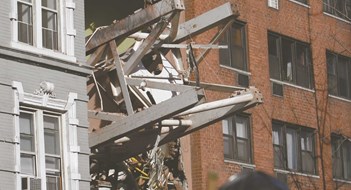Workers’ compensation, according to the New York State Workers’ Compensation Board, is insurance that provides cash benefits and/or medical care for workers who are injured or become ill as a direct result of their job. Employers—an…


Workers’ compensation, according to the New York State Workers’ Compensation Board, is insurance that provides cash benefits and/or medical care for workers who are injured or become ill as a direct result of their job. Employers—an…

Just like in our own personal budget, it seems that the everyday expenses of a co-op or condominium building just keep going up. Among the most prevalent cost hikes, as readers surely know, are fuel, salaries, repairs and the price of ma…

It’s capitalism’s most basic tenet: supply and demand. When supply is sparse and demand high, prices go up. When supply is plentiful however, prices go down—and suppliers are forced to diversify their offerings in order to distinguish th…

If you live in a condo or co-op in New York City, your building is obviously protected with insurance—but do you really know about the various layers of protection standing between your community and a broad array of risk factors? Does y…

It’s a scorching 92 degrees in Manhattan and many city-dwellers are dreading the traffic-filled ride to the beach or the long bus or rail commute to the Hamptons. But for some lucky co-op and condo owners, relief—in the form of an in-hou…


It is an annual rite of passage for owners of co-ops and condos. Once a year or thereabouts, they gather in a common area—in my co-op in Astoria it was the basement, right off the washers and dryers—and vote for next year’s board. Someti…

Like it or not, e-mail is a permanent fixture of contemporary business communications. In real estate, board members and property managers use e-mail to discuss the most official and the most personal matters of their lives, from schedul…

On July 1, 2008 the New York City Department of Buildings (DOB) put into effect a new plumbing code. It is the first major revision of the code since 1968 and it puts a new focus on backflow prevention—the reverse flow of contaminated wa…

One impact of climate change is being felt as natural disasters of increasing frequency and strength are causing extensive damage to homes and businesses. The four hurricanes of 2005—Katrina, Rita, Wilma and Dennis—caused more than $57 b…

New building codes went into effect on July 1, 2008 that have completely revamped the inspection and testing procedures for elevators, escalators and other vertical transportation equipment in buildings. The new and more stringent elevat…

Q Our board of managers want to replace the terraces in our condominium without the consent of the unit owners that have them. If you look at Real Property Law, Article 9-b of the Condominium Act, Section 339-i, Common Elements, u…

Q We have a number of apartments in our condominium where owners have not paid maintenance for a few months. As our condo is in the process of legal action and collection against these owners, can we stop their access to the apartment unt…

Q I am on the board of a cooperative building in New York City. We have recently received two requests from shareholders looking to borrow additional funds by taking out a second loan, (in each case an equity line of credit arrangement) t…

Q Can we have a superintendent on the board of directors although he is not a shareholder? Is this a conflict of interest? What are the pros and cons of an employee being on the board? —Confused & Conflicted A “There is no pro…

Q The president of our 75-unit co-op instructed the management company and the superintendent to knock on each shareholder's door and ask for their proxy. The president was up for re-election and wanted to secure his position. The co-op i…